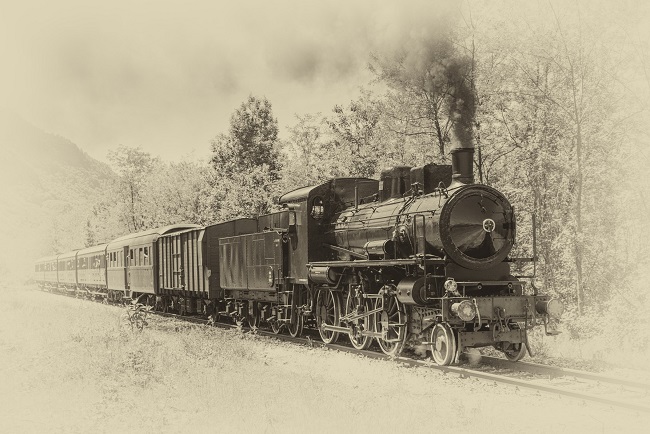Feb 19, 2026
Feb 19, 2026
Mother, I sit by my window for hours on end
And watch the long trains rumble past.
Some are dark and journey tediously,
No doors, no windows, no shining lamps.
Slowly they move: like huge elephants
That move like shadows in the shadowy dark.
Sometimes a train comes flashing past
With many windows lit by many lamps
That dance and whirl with movement swift.
A marriage procession with music loud.
Shrill whistles that rise above the din
Of the rhythmic beat of wheels revolving fast.
On hot afternoons you go to sleep
And with dizzy heat swoons all the world,
Even the crows doze and forget to caw,
The dog lies in the shade with hanging tongue.
I watch for hours and still the tireless trains
March on and on along their iron road.
Sometimes at night in my sleep I hear
The low distant rumble of the train.
I rub my eyes and sit up on my bed
And beneath the light of the flickering moon
Moves the long shadowy outline far away
Like a huge serpent crawling through the night.
Where do all these trains go day and night ?
You say they bore their way through hills,
They roar over bridges across mighty streams.
They crash through forests and vast plains.
But at the end of their restless joumeyings —
Where do they go and finally rest?
Trains, which was written in 1932, has been incorporated in Mahatma and Other Poems poetry-collection of Humayun Kabir and the book was published and brought by in 1944 from Asia Publishing House. With the view and scenery of the passing trains, there runs in a parallel way the train of thought and idea.

The poem is of a deeper meaning. There is a search for meaning. There is mystery in the lines. From where do they appear all of a sudden and where do they vanish away? It is really strange. How do they keep tumbling bogey after bogey? How do they keep running on the rails? How have they taken the sleep away? How have they enchanted us with the whistle and the passing? Crossing over the secluded places, fields and fallows, highlands and marshes, wetlands and hilly terrains, woods and valleys, they cover up the distance away from public places, taking to their routes, passing over the bridges, sailing through or hurtling, they keep passing and running, chugging, whistling and covering the distance and stop they not at all failing us quite in assumption to measure by day and night. It all depends on the distance and the coverage to be undertaken. To cover and reach the distance is its song.
Even during the daytime, he waited for the trains to come and pass.
The dog may keep panting. The crow may doze off. The midday siesta may force the folks to rest and sleep. But he has not tired of waiting to see the trains passing. Trains have always engaged him and his mind.
The poet remembers how he as a child sat on the bed hearing the faint and sweet rumble of the train. How has he rubbing the eyes sat on the bed in the dream or sound of the train whistling and coming and passing away in sleep? Like a mammoth, it comes and goes away. Just like a serpent it seems to be passing under darkness.
It is a beauty to see the trains coming, passing, approaching, arriving at and whistling and moving away. From the hamlet homes, they can be seen passing. How have the trains haunted our imagery? How have the bogies been tumbled and pulled and driven away? While reading the poem, the history of man and his advancement flashes over the mind’s eye, the history of the locomotive industry dances upon the mind’s plane.
A child, the poet loves to see the trains coming and passing by even though he has to wait for a long time sitting by the window. There is a pleasure in watching the trains come and go. The lovely sight, how to miss it? The imagery connected with the passing trains.
Boring the hills, they pass through the tunnels, roaring over the bridges on the mighty streams they sail away. They crash through the forests, deep and wild and vast plains traversing and furrowing them to reach the unexpected destination and cover up a journey never thought about.
But who to answer it? Where do they go to? When will the strenuous journey end?
To read the poem is to think how our trains were almost a century ago.
Image (c) istock.com
10-Jun-2023
More by : Bijay Kant Dubey